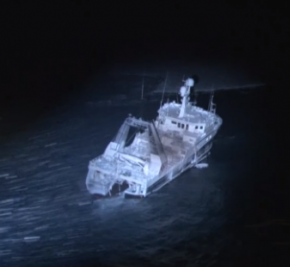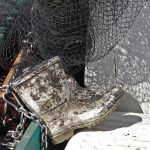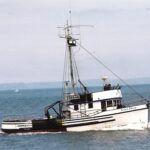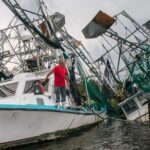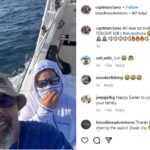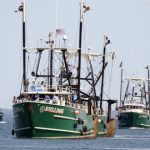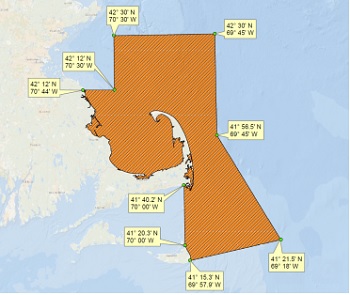Monthly Archives: December 2018
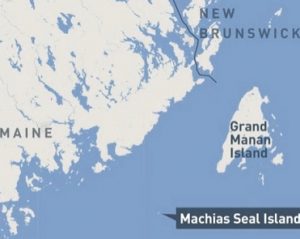
Lobster fishing bill draws focus onto grey zone
A bill to allow Maine lobster fishermen to haul their traps at night throughout most of the year in the disputed “grey zone” has again drawn attention to the 165-square-kilometre fishing area centered around Machias Seal Island that is claimed by the U.S. and Canada. Cutler fishermen are supportive of the legislation, since they say it would help them prevent Canadian fishermen from hauling their traps, while Grand Manan fishermen say any bad apples in the fishery can be found on both sides of the border. Rep. Will Tuell of East Machias submitted the bill, which would remove all nighttime restrictions on lobster fishing from Labor Day to Memorial Day, at the request of a group of Cutler fishermen. >click to read<17:55
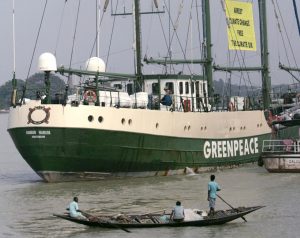
Greenpeace’s iconic “Rainbow Warrior” boat was disposed of in a way the group campaigned against for years.
Greenpeace quietly admitted in November one of its “Rainbow Warrior” boats was “scrapped on a beaching yard in Bangladesh” — a method it spent years campaigning against. “We have made a mistake, one that we have tried to correct,” Greenpeace International, based in Amsterdam, admitted in mid-November, adding it allowed Rainbow Warrior II “to be scrapped on a beaching yard in Bangladesh, in a way that does not live up to the standards we set ourselves and campaigned with our allies to have adopted across the world.” However, the embarrassing admission from one of the world’s largest and most prominent environmental groups flew under the radar of major news outlets. >click to read<15:09
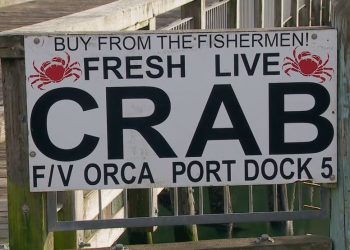
Dungeness crab season to officially open in January for parts of the Oregon coast
After a month-long delay, the Dungeness crab season is set to open at the beginning of January in Oregon, but industry experts say these appear to be a trend and they hurt coastal communities. Oregon’s Department of Fish and Wildlife will open the crabbing season for the central and northern coast. Fishermen can set their pots on Jan. 1 and begin pulling them on Jan. 4. It was supposed to open on Dec. 1. Officials delayed the season because there was not enough meat in the crabs. Rough weather also delayed testing. If all goes according to plan, you may be able to find crab in the markets by about Jan. 10, according to sellers. >click to read<13:39
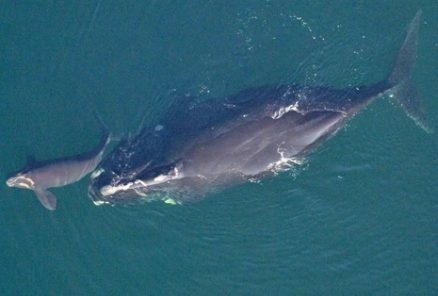
Rare North Atlantic right whale calf spotted off Florida
A North Atlantic right whale calf spotted Friday off Florida with its mother is the first of the calving season for the imperiled marine mammals, after last year’s season passed with no documented births. “Super excited, super excited,” said Christopher Slay, owner of Coastwise Consulting, the company that provided endangered species observers aboard a dredging vessel off Jacksonville Beach, near the mouth of the St. Johns River. >click to read<10:25
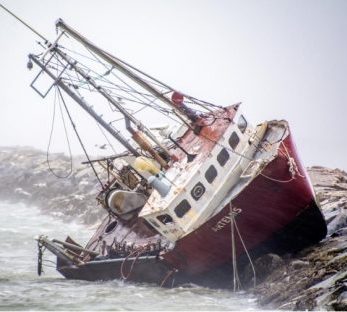
Another bewildering chapter in the odyssey of Artemis
The ghost of the derelict scallop boat Artemis, whose owner set a strong standard for scofflaw vessels during his time in Gloucester, continues to hover over its final resting place along the side of Provincetown breakwater. The Artemis, a 42-foot metal boat owned by John F. Christiansen of West Yarmouth, broke free of its mooring in Provincetown Harbor in the midst of a March 2 nor’easter and went aground on the rocks of the town’s West End breakwater. And there it sat for months, as Provincetown officials arm-wrestled with Christiansen to remove it. In June, Provincetown police came up with a curious solution: They charged Christiansen with littering for refusing to extract the vessel off the breakwater. >click to read<09:47
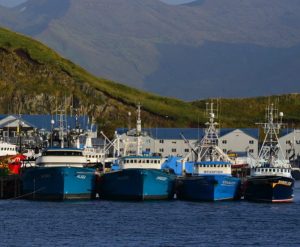
Government shutdown, if it continues, could cost Alaska’s lucrative Bering Sea fisheries
Even if the shutdown does persist, the federal government will allow the Bering Sea fisheries to start as scheduled, with an initial opening for cod Jan. 1, and a second opening for pollock and other species Jan. 20. But the fisheries are heavily regulated, and before boats can start fishing, the federal government requires inspections of things like scales — for weighing fish — and monitoring equipment that tracks the number and types of fish being caught. And the National Marine Fisheries Service, which regulates the Bering Sea fisheries, isn’t doing those inspections during the shutdown. >click to read<20:16
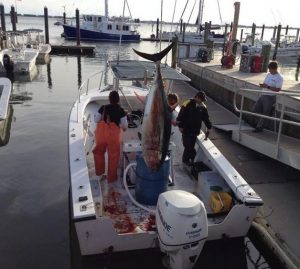
Fishermen report bluefin tuna season off to a slow start
The bluefin tuna season is underway in North Carolina, and more than 13 metric tons have already been landed, most of it in Carteret County. However, several local seafood dealers and commercial fishermen have said the season’s actually been rather poor so far, but there’s still time to catch more tuna. Morehead City seafood dealer Donald Diehl said the season has been “not really that good.” Mr. Diehl is a dealer that specializes in bluefin tuna, representing International Lobster and Maguro, a company based in Japan, where there’s a huge market for bluefin tuna. >click to read<17:40
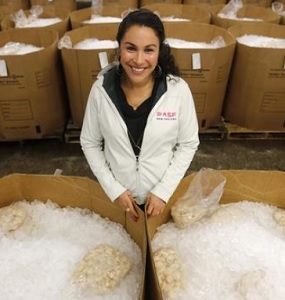
SouthCoast Woman of the Year: Canastra’s drive helping keep groundfishing alive
Among the grizzled lifelong fishermen sat six-year-old Cassie Canastra. She staked claim to the seat toward the right side of the second table in the small room where thousands of pounds of fish were auctioned off each day. Her spot faced the television and was the closest to the sweets brought by her father, Raymond. Her pastry of choice: Malasadas. “She knew I was going to go to the Portuguese bakery before work. She wanted that,” Ray said with a loud chuckle. “That’s the truth.” The malasadas certainly didn’t deter her from begging her parents to wake hours before sunrise to arrive at the Buyers and Sellers Exchange seafood auction for 4:30 a.m. >click to read<11:56

SouthCoast Man of the Year: Kevin Stokesbury continues to seek solutions to fishing industry challenges
It’s pretty well known around these parts that homegrown research proved the ocean held more Atlantic sea scallops than federal regulators thought. And a lot of folks know that the value of those succulent bivalves has made New Bedford the highest-grossing fishing port in America for 18 years running. Starting in the late 1990s, Professor Kevin Stokesbury of the School for Marine Science and Technology at UMass Dartmouth, working with SMAST founding dean Brian Rothschild, developed a video technique to count scallops on the seafloor without harvesting or killing them. Along the way, he pioneered a partnership with local fishermen. >click to read<11:20
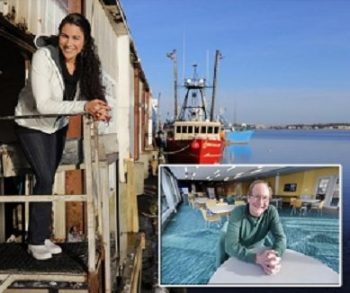
Lifting all boats: 2018 honorees fight for the future of the New Bedford fishing industry
The year 2018 was like none other for the New Bedford fishing industry. The groundfish industry, already reeling from several decades of species collapse and arduous federal regulations, suffered a crippling setback with the National Oceanic and Atmospheric Administration’s ban on fishing in Sector 7. The Standard-Times and SouthCoastToday this year are proud to name Cassie Canastra and Kevin Stokesbury as the SouthCoast Woman and Man of the Year for what they have done for the industry that year after year makes New Bedford the Number 1 dollar fishing port in the nation. >click to read<23:12
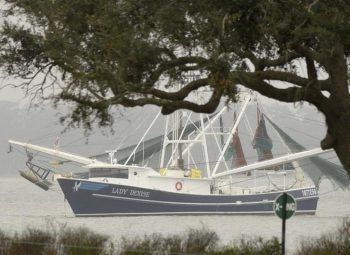
Georgia: Shrimping season closes after record year
The end of the year also means the end of the current Georgia shrimping season, which is legally required to shut down at 6 p.m. Monday — that covers the traditional three miles from shore covered by state regulations. According to the state Department of Natural Resources’ Coastal Resources Division, activity has to cease on trawling, cast-netting and seining, and other food-shrimp harvesting efforts. However, “anglers and commercial bait-shrimp dealers may continue to harvest shrimp to use as bait.” >click to read<13:58
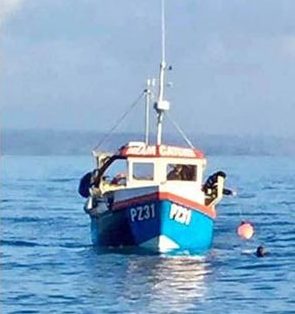
Overboard fisherman dragged for five miles
A lone fisherman had a miraculous escape after falling overboard at sea. He managed to grab his nets and clung on as his boat dragged him five miles for more than an hour through the freezing sea to shore. Fortunately Nathan Rogers’s vessel was on auto-pilot and heading for the Cornish port of Newlyn, where it ploughed into a pier wall. The alarm was first raised by eagle-eyed Louis-Matisse Nicholls, who saw the crash from Sandy Cove, a beach on the edge of Newlyn, and spotted Mr Rogers, 40, in the water. The 11-year-old boy said: “I was beach cleaning and saw this boat crash right into the harbour and saw this head bobbing up and down. I told my dad to phone 999.” >click to read<12:37
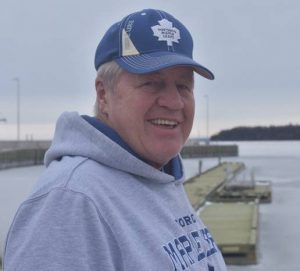
‘I will miss it. There’s no doubt about that’: Caribou Fisherman’s Wharf Harbour Manager retires after 36 years
Fifty years-ago, the Caribou Fisherman’s wharf would receive routine visits from Bayview boys riding over on their bicycles. “I was just fascinated with coming to the water or here to the wharf,” said John Lakenman as he drove slowly around his workplace for the last 36 years. The Caribou wharf was a lot smaller back then when there might have been only four boats tied up. Today the Caribou wharf could conceivably hold 80 vessels. A younger Lakerman didn’t know that he would one day be in charge of one of the largest wharfs on the Northumberland Strait. “Never in my wildest dreams,” he said. “ >click to read<11:35
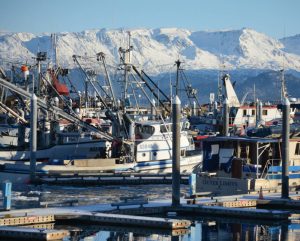
Alaska: Seafood industry faces more uncertainty
As another year draws to a close, the seafood industry seems to be facing even more uncertainty than usual, with some groundfish stocks cratering, salmon runs behaving in historically strange ways, trade wars with China imposing some tariffs on a variety of products, and the state being on the forefront of climate change. The year started out with a Pacific cod quota cut of 80 percent in the Gulf of Alaska, an unexpected drop after a strong year class from 2012 suffered unusually high mortality due to a warm period from 2014 to 2016.,, Bering Sea crabbers started the year with a 19.5 million-pound opilio quota that proved difficult for some boats, >click to read<09:30

Convicted Newfoundland skipper wants trial reopened-was found guilty last month of trying to throw a female crew member overboard
A Corner Brook judge has agreed to hear a local’s skipper’s application to reopen his trial, even though he has already convicted the skipper of trying to throw a female crew member overboard. Trent John White was convicted last month of aggravated assault, assault and damage to property in connection with incidents that occurred while he was skipper of a commercial fishing vessel participating in the 2017 turbot fishery. The 65-foot vessel had left Rocky Harbour for the Labrador Sea near Red Bay to take part in the fishery that summer. In the Strait of Belle Isle, White tried to throw the woman — who was also his girlfriend — overboard. Provincial court Judge Wayne Gorman declared White guilty after a trial, saying he had found White’s evidence to be purposely disingenuous, dishonest at times, unreliable, incredible and fanciful. >click to read<18:44
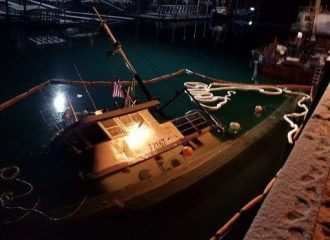
Sunken fishing tender is a loss
A 71-foot fishing tender that sank at Seward’s T-Dock in early December has been refloated and was being turned over to a Seward boat repair firm for final disposal. Officials with the Alaska Department of Environmental Conservation said Dec. 21 that the F/V Nordic Viking had been lifted ad dewatered by Global Diving and Salvage, Inc. on Dec. 20 with Alaska Chadux Corp., an oil spill response organization, deploying containment boom, and that the vessel was heading to Raibow Fiberglass and Boat Repair for disposal. >click to read<17:47

Ilwaco: Ocean conditions again interfere with crab sampling
On Thursday turbulent seas again got in the way of collecting Dungeness crab to see if they have at least 23 percent meat in the waters south of Klipsan Beach, a requirement before the region’s commercial crabbers can start the 2018-19 season. The crab season traditionally starts Dec. 1, but is often delayed. Last season, harvests didn’t begin until Jan. 15, 2018. This season, early testing found crab slightly under 23 percent off the Long Beach Peninsula and substantially low in meat off southern Oregon. Delays have mounted as rough conditions keep a vessel contracted by the Washington Department of Fish and Wildlife from dumping pots — first on Dec. 22 and then on Dec. 26.>click to read<11:59
BREAKING: More crab season complications – >click to read< 16:44

DFO recruiting fishery officers in N.L.
The Department of Fisheries and Oceans (DFO) is looking to bring new fishery officers to the province. DFO’s conservation and protection unit is in the midst of a nation-wide recruitment campaign. Applications for new recruits will be accepted until Jan. 2. “Our fishery officers are on the water, on the wharves, in communities and at facilities ensuring the conservation and protection of species, and the long-term sustainability of Indigenous, commercial, and recreational fisheries,” reads a news release from DFO. >click to read<11:03
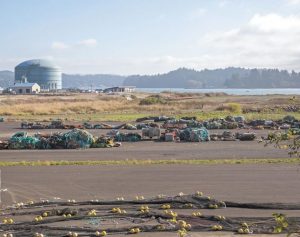
Port of Newport – Trawlers warm to shipping deal
An icy impasse between log shippers and fishermen that clouded the future of the Port of Newport and its new $20 million International Terminal showed signs of a thaw last week. At a meeting of the port’s commercial fishing users on Dec. 20, industry leaders were cautiously optimistic about a new proposal by Teevin Bros. to ship logs from the 500-foot terminal that fishermen claim is indispensable to 28 large vessels of the deepwater fleet based here. >click to read<10:36
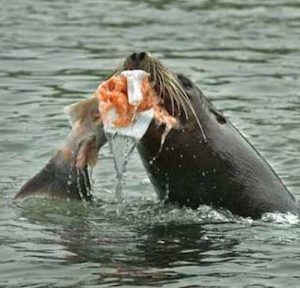
Sea lion bill signed into law by President Trump
Legislation that allows the lethal taking of sea lions that prey on at-risk fish populations on the Columbia River and select tributaries in Washington, Oregon and Idaho has been signed into law by President Donald Trump. The bipartisan bill, co-sponsored by Sen. James Risch, R-Idaho, and Sen. Maria Cantwell, D-Wash., makes slight changes to the Marine Mammal Protection Act of 1972, which lays out prohibitions for killing marine mammals, and institutes a permit process for the lethal taking of sea lions. Permit holders are legally allowed to kill sea lions that are part of a population and/or stock that is not classified as being depleted or at risk.>click to read<20:41
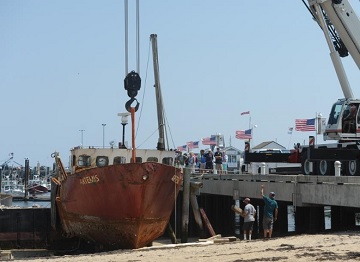
Littering charge against owner of Provincetown dragger dismissed
A charge of littering against the owner of the Artemis, the defunct fishing vessel that sat on the Provincetown West End breakwater for months earlier this year, was dismissed in Orleans District Court earlier this month due to “insufficient evidence.” John Christiansen, 54, of West Yarmouth was charged by Provincetown police in June, after he failed to remove the 42-foot-long steel hulled ship off the breakwater where it had lodged during a storm. >click to read<18:40
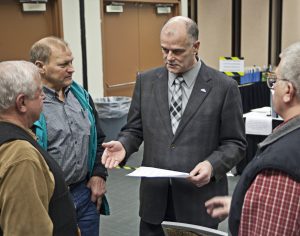
Work continues on federal plan for Cook Inlet salmon
More than two years after a court ruling ordered the North Pacific Fishery Management Council to develop a management plan for the Cook Inlet salmon fishery, a stakeholder group has made a first set of recommendations. The council convened a Cook Inlet Salmon Committee last year composed of five stakeholders to meet and offer recommendations before the council officially amends the Fishery Management Plan, or FMP, for the drift gillnet salmon fishery in Upper Cook Inlet, which occurs partially in federal waters. >click to read<15:13
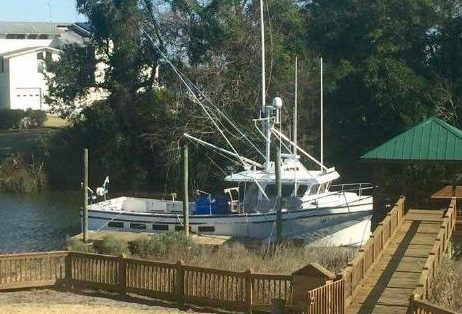
Athearn Marine Agency Boat of the Week: 45′ Millenium Marine Tuna/Longline
Specifications, information and 22 photos >click here< To see all the boats in this series, >click here< Vessel cruises at 10 – 12 knots and 18 – 20 knots WOT. New L/P mini super spool 22 mile longline reel, beeper buoys available for additional $20,000. 14:20
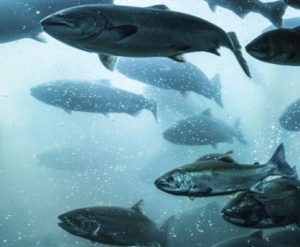
Russell Wangersky – Farmed Salmon: Left behind
It sometimes feels that we’re perpetually jumping onto a ship just about the same time as everyone else is abandoning it. And nowhere does it seem more like that than in the aquaculture business. As the plans steamroller ahead for a new massive Placentia Bay open pen Atlantic salmon project with the provincial government (and key regulator) fully onside, it’s hard to ignore that many others are moving in the other direction. In the state of Washington, a large-scale fish escape saw that state announce a ban on Atlantic salmon pen farming and a wind-down of existing operations. (The salmon aquaculture business in Washington is back under the microscope this month after 800,000 juvenile salmon had to be destroyed because they were found to be carrying a strain of Piscine orthoreovirus, which is dangerous for wild stocks of salmon.) >click to read<
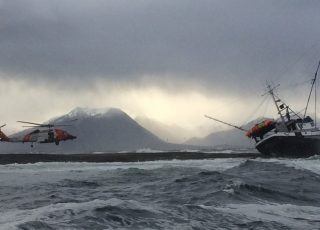
Catch Shares – Costs rise while values fall; season starts uncertain during shutdown
Fishermen in Alaska who own catch shares of halibut, sablefish and Bering Sea crab will pay more to the federal government to cover 2018 management and enforcement costs for those fisheries. ,, “The value of the halibut fishery was down 24 percent year over year, while sablefish was down 21 percent,” Greene said, adding that the decreases stemmed primarily from lower dock prices. ,,, Fish shutdown shaft-Hundreds of boats that are gearing up for the January start of some of Alaska’s largest fisheries could be stuck at the docks due to the government shutdown battle between President Donald Trump and Senate Democrats. >click to read<14:40
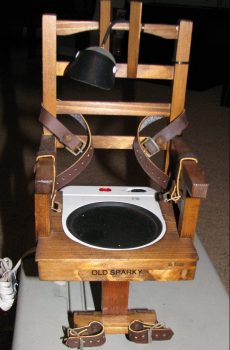
Swiss lobster stunning device awaited
Many people like to eat lobster over Christmas, but a Swiss-developed machine to stun the animal before boiling and thus meet new regulations is not yet ready. A law was introduced in March this year that aims to prevent cruelty to crustaceans by banning live boiling, among other things. It says the lobster must be stunned before plunging it into boiling water. The Swiss government based the regulation on studies that show lobsters feel pain. Equipment has been developed by Swiss firm Rund um Fisch to electrocute the lobster before cooking. >click to read<12:42
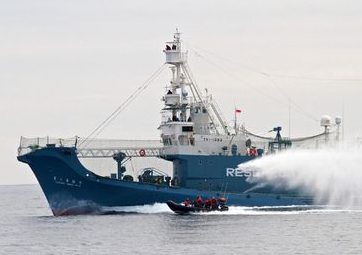
Japan to start whaling again
Japan has announced it will resume commercial whaling next year and withdraw from the International Whaling Commission. A government spokesman made the announcement on Wednesday in a move expected to spark international criticism. The decision was made at a cabinet meeting on Tuesday after the government decided it would be difficult to resume commercial whaling while a member of the international body. “We have decided to withdraw from the International Whaling Commission in order to resume commercial whaling in July next year,” top government spokesman Yoshihide Suga told reporters. Mr Suga said whaling would be limited to Japan’s territorial waters and exclusive economic zones. >click to read<11:56
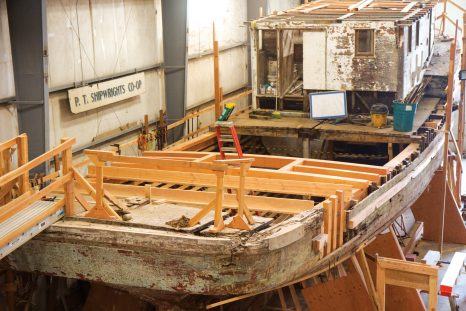
Work ramps up on Western Flyer
Sitting in the pilot house of the Western Flyer, the fishing boat that John Steinbeck and Ed Ricketts took down to the Sea of Cortez, shipwright Pete Rust is surrounded by history. He also is surrounded by a quandary. “The difficult thing I’m doing right now is trying to figure out how to remove the house from the boat without damaging it and without losing the original shape,” said Rust, a member of the Port Townsend Shipwrights Co-op, which is restoring the historic boat. The goal is to take the house off the boat and frame it on the floor to rebuild and restore it. But Rust has to figure out how to do that without the structure collapsing in on itself. >click to read<11:05






